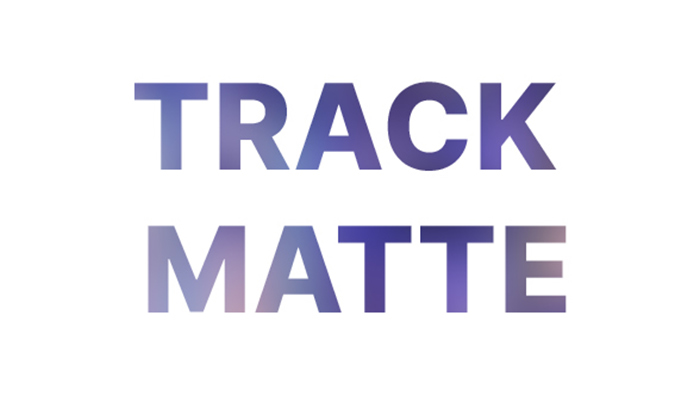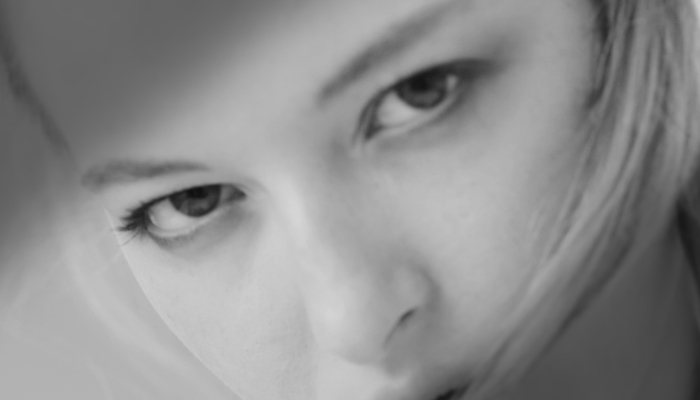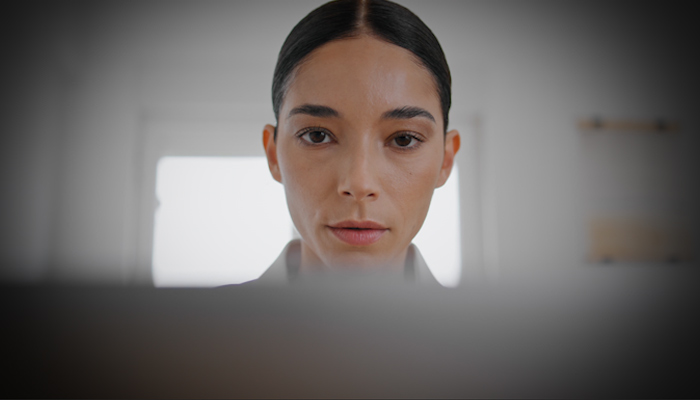Today we’re talking with three of the editors of the Disney Plus series, Andor - John Gilroy, ACE, Yan Miles, ACE and Simon Smith.
John Gilroy, ACE, is an editor and also a producer on the series. He was nominated for a BAFTA and an ACE Eddie for the feature film Michael Clayton. And he was nominated for an ACE Eddie and a BAFTA for Nightcrawler. His feature work includes Rogue One: A Star Wars Story, Suicide Squad, Pacific Rim, The Bourne Legacy, and Salt, among many others.
Yan Miles, ACE, has edited some of the great TV series of recent years, including Game of Thrones and Band of Brothers. He won an Emmy and was nominated for an ACE Eddie for The Crown and he won an Emmy, a BAFTA and an ACE Eddie for Sherlock.
Simon Smith has been on Art of the Cut before when he won the Emmy, the BAFTA, and the ACE Eddie for Chernobyl. He also recently won the ACE Eddie for cutting the “One Way Out” episode of Andor.
Art of the Cut: ANDOR
John, you are listed as a producer on this show. I was just talking about this with another editor who got a producer credit. How does that happen? What is the value of that?Gilroy: Tony Gilroy is the showrunner, and I've edited everything Tony's done. I edited four episodes. I'm also overviewing everything, just making sure everything flows right. I'm also finishing all the shows. All the shows will, eventually, filter back to me. We do all the VFX, music, and mixing. I oversee the whole process. I'm on from the very beginning. I'm the last to leave. Everybody else comes and goes. They come in and they cut their episode and they do great. They're on to another job.
Do you think that's just your experience with him and your tenure on other shows and other work? He trusts you and needs another set of eyes, or what do you think that producing credit is for?Gilroy: I've always been a very hands-on editor. In the first few low-budget films you're doing, you have to wear a lot of hats. You don't have a post-production supervisor or a music editor. You have to do a lot of things on your own and you move the ball forward.
It's being an editor, but also being a manager of a department. You're just trying to be a good sheriff and make sure everybody's happy, but, make sure the work's going along. If there's a problem, you can deal with it. Sometimes editors can climb inside the footage and can see things that you can't see from the outside. Sometimes it's about examining something and then saying, "What about, this? Or what about that?" That's primarily my job.
Our truth barometer, or the “truth radar” editors have, is one of our most critical skills. Because you’re in this fantastical universe, does that make finding truth harder?Miles: Tony's writing is truthful. That's where it starts. It's something you could touch. It has a protein. It's credible. Science fiction is so broad. We've got aliens and spaceships, but the heart of it, the narrative is current. It runs and chimes with oppression, and the social dysfunctions, and Ukraine and all these parallels - which is where sci-fi tends to lead. But, sometimes it can be watered down by science fiction itself. This narrative is pretty solid in its style. That comes from Tony. It comes from the scripts. That's what I saw when I watched Rogue One. When I came on board, the first thing I said to John in the meeting was, "This feels solid. It feels tangible and relatable. The dialogues are relatable."
Smith: I totally agree with Yan. The scripts were amazing. This is Star Wars and definitely, it's got the "war" element in the whole thing. Tony's a big war and history buff. He knows his, WWI history, and his WWII history. My episodes were set in a prison. They arrested the main character off the street for no "real" reason. The thing that I took from that is, it was slave camps. It was putting people into the gulag basically, and making them work for the empire. What so many people have taken away from the writing in Andor, is the historic allegories in there.
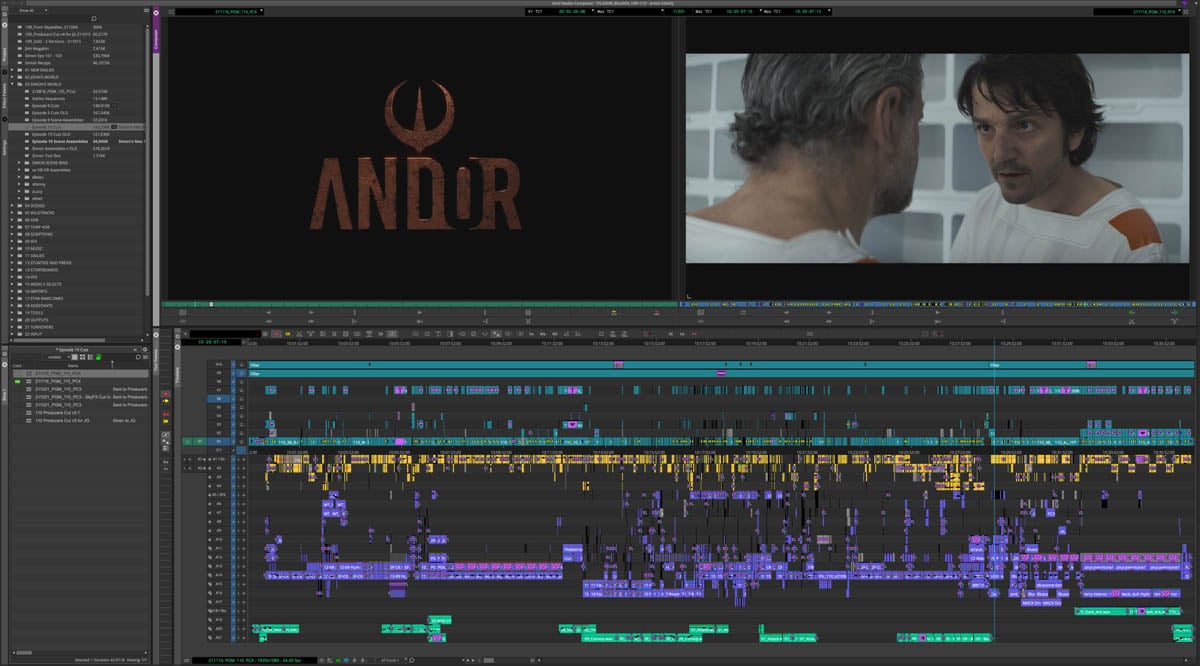
Avid timeline screenshot
Gilroy: It's also just good storytelling. We have no two-dimensional characters in our show. Everybody is fleshed out. It's about being a good student of human interaction. And that truth lies in the strength of our show. It's interesting sometimes you're working on something and the writing is uneven and the character is really smart, and then they're not so smart. What happened there? Why'd they do that? We have none of that. We gut-check ourselves all the time. It's in the writing, but it's also in how we build the shows and fix things along the way. That's the truth, the human element, which is weird because it's all about aliens.
[laughter]
Because so many of these Star Wars stories are tied together, do you feel the need to watch all the other shows? Do you see the timelines and do you watch specific films or TV series or do you just worry about your episode?Gilroy: I dip into the other episodes, out of curiosity. Our timeline is this finite loop. When Rogue One ends, A New Hope begins five minutes later. This is the five-year journey before Rogue One. We're in our own little universe. Within that context, there've been all sorts of different time jumps in the Star Wars canon. But we brush against things we're supposed to brush against.
We keep our eye on the ball. We're talking about Diego Luna's character, the people that meets along the way, and his transformation from a guy who's not doing very much to becoming this revolutionary hero.
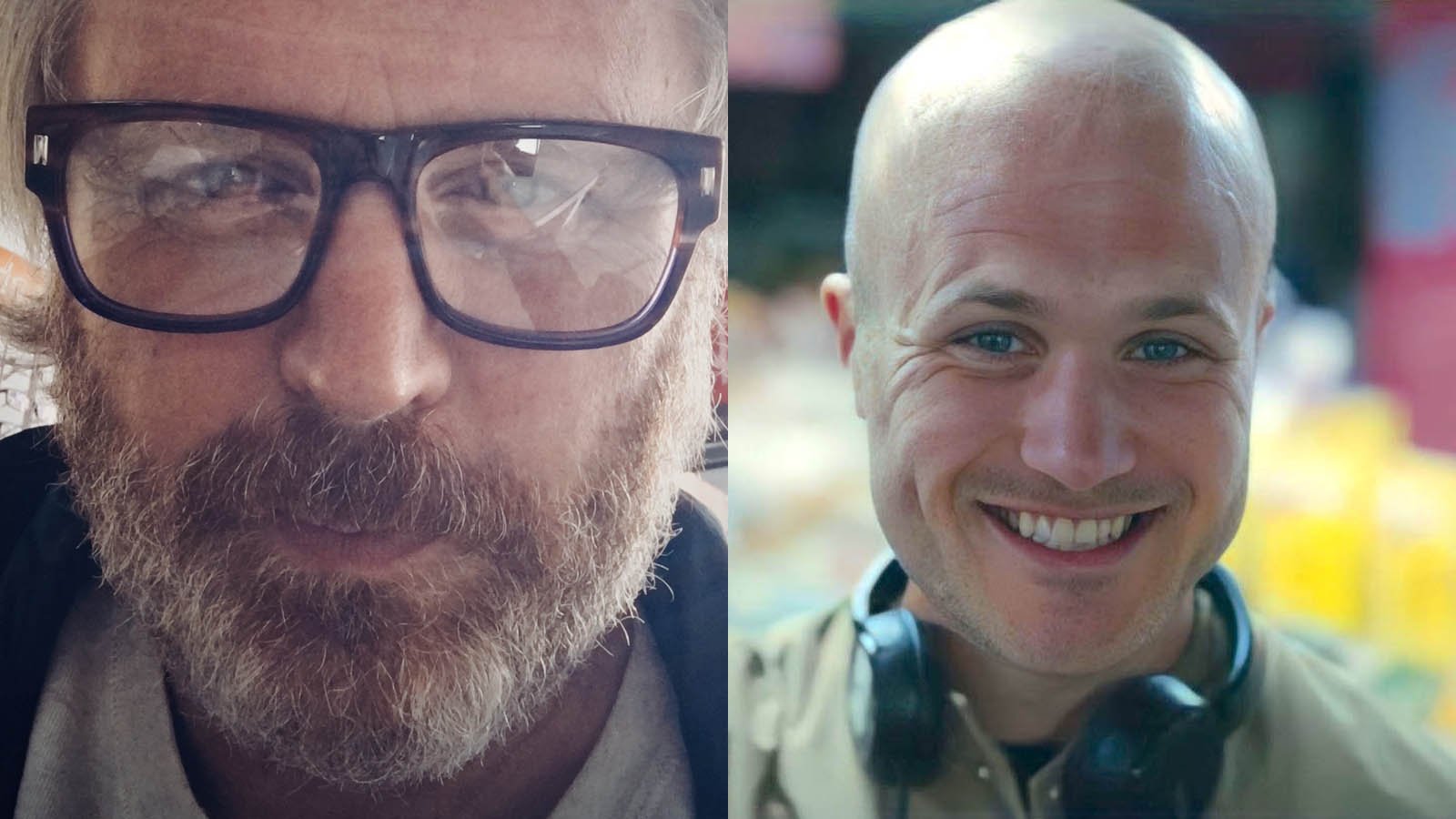
Yan Miles, ACE and Simon Smith
Miles: I grew up with the first three: Star Wars, Empire Strikes Back, Return Of Jedi as a young man, and that had a huge effect on me. Empire Strikes Back was the first film I watched as a young boy where the bad guys won. It was just bizarre. I'd never had that twist of fate. That stayed with me. I didn't watch the rest of the Star Wars. Rogue One was what pulled me back to those films. Andor, feels, for me, some of those similarities between those first three.
Smith: It's worth discussing as well that John said that he's the first editor in and the last editor out. I was the other way around. I was the last editor in, and out much earlier than John was. But when I came in, everyone else had already been working and had found what the series was. Joining the series, I'm working with, super editors like John Gilroy, Yan Miles, Fran Parker and Tim Porter, and so on. I've got to really punch up with these brilliant guys.
There's a funny story, which I'd like to fess up to. There was one day when Yan came into my room and said, "Simon, have you been watching my episode?" I was like a little rabbit in the headlights and, a little bit embarrassed to be honest. I said, "No, I don't know what you're talking about. [laughter] He caught me off guard, completely.
Miles: You left a paper trail behind you.
Smith: I had had a look at Yan's episode and I'd looked at John's episode and everyone's episode because...[ laughter]
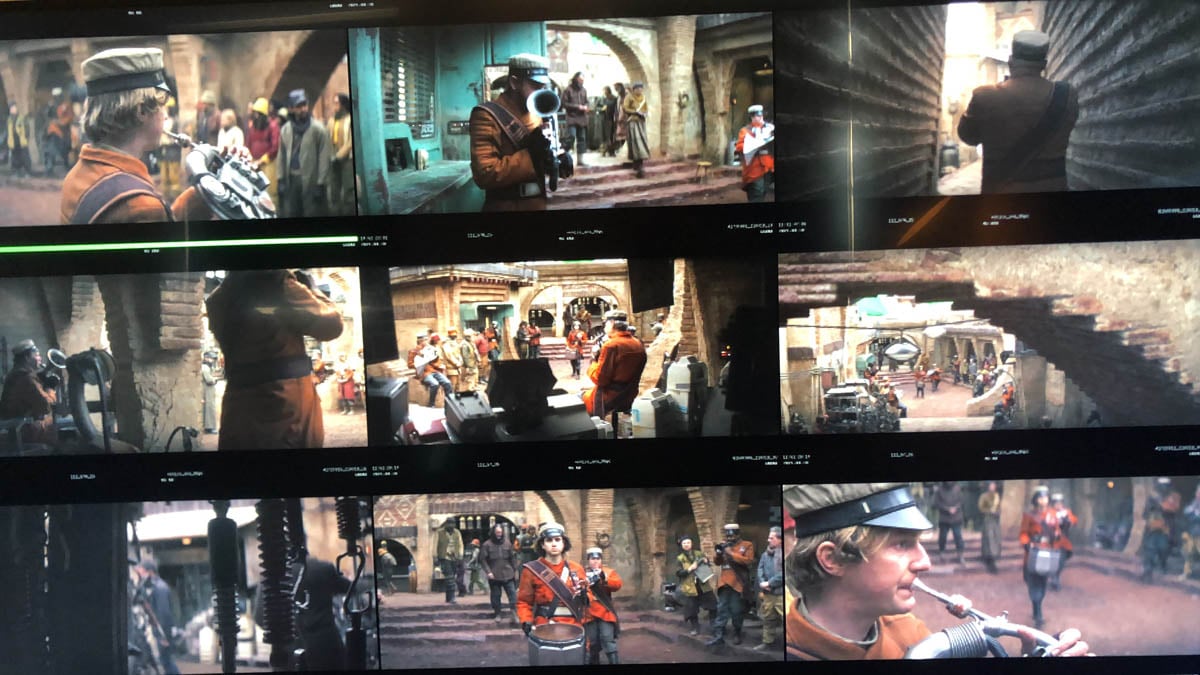
Screenshot of a group clip (Avid multi-cam) of the marching band scene.
Miles: I'm pretty sure I said you can watch it as long as you ask. Right?
Smith: That's the stupid thing. If I just asked him, it would've been fine. I know it would've been fine, but I think there might be a bit of first-day anxiety or first-day nerves on a job, especially when you're working on Star Wars. This is a big deal. On Andor, it was always super important to me to make sure that I was delivering at the standard and, so on, especially for the people around me. I've been holding that in Yan for about a year...[laughter]
Gilroy: I'm glad you kept him honest without all that.
Miles: The good news, Simon, is that it worked rather well for you, didn't it?
Smith: I'm very lucky to have such brilliant editors to learn from and talk things through. For me, an experience like that, especially with John, Yan, and Fran Parker as well she's an incredible, well-known editor here in the UK, and in the States. So, I did watch all the episodes in the series.[ laughter]
Gilroy: It's a good thing to know. It's encouraged on some level. Why would you really hold it back? You want to give everybody as much context as possible. The more you know about somebody else's episode preceding yours, the more you're going to understand your own. It's only good filmmaking.

Steve Hullfish and Simon Wilcox at the 2023 ACE Eddies after Simon's Eddie win for Andor.
With the secrecy of the Star Wars universe, did all of you get a chance to read all of the scripts or not?Gilroy: Well, I did, but I have an inside track there. Yeah, I think everybody had because again, you needed to see where the arc was to do your own. The scripts were super secret. You could not get your hands on a script and there were no paper scripts floating around. If you were working, you wanted to see the arc. It was very important when you're building your show to understand the temperature of things as you go through.
Miles: It was a bit more difficult for me because we did block two - block two consisted of episodes seven, eleven, and twelve. John was in with Tim and when we came into block two, I was doing the end before some of those scripts have been fleshed out. I was putting quite a lot of fires out in that process in the edit. I didn't have much time and John, you were probably deep in your fine cut at that point. Simon, you hadn’t even arrived at that point. It was quite bizarre to be doing a finale in a block two slot.
Gilroy: It feels a little premature, right? It didn't hurt you.
Miles: No, again, I just trusted what Tony's words were, and what he would talk about with Ben, the director. They had weekly calls. I would just lean in and trust that. I remember Tony said, "I can't believe I've locked the last episode of the show, at the beginning of the process." This is bizarre in television. That doesn't often happen.
Gilroy: The scripts were tight and Tony had a great battle plan. You could rely on them. They threw quite a bit of money at this for television and it really looks like a big movie. It's like we made four movies in two years. That's the way I look at it. It looks really good. There's not a lot of “finding it in the cutting room.” We've all worked on movies where you're restructuring. There was really none of that. We basically used every scene we shot. Every scene is in the show, which is incredible. So we really did stick to the plan - and because we could stick to the plan - we could use all our resources to push the ball forward. It wasn't like we were zigzagging trying to find where we were supposed to be. So that's probably why Yan was able to do the last episode so early.
Smith: We were editing during Covid as well. As post-production, we were in our own little bubble. We weren't working at home because having Star Wars sent out to all of our homes might not be the best plan. The UK editors were all at Pinewood, in our Covid bubble together. We'd all have lunch together outside on the lawns in Pinewood. Because of that, it did allow for all of those conversations to help me understand what's my character doing here, or what did he do in your episode. Or, how is this working? Even the assistants were all over it in terms of characters, locations, and story arc.
Yan mentioned the block shooting. Can you explain what block shooting is and how those blocks were determined.Gilroy: The first three episodes would be considered a block. There's a story arc that builds from the first episode to the second and comes to a climax in the third. There's some resolution, and then there's a page turn and you're into the next block. Four, five, and six.
It was great because these page turns were totally different environments. Simon was in prison the whole time. One of the most diabolical prisons I could ever imagine. Seven was a standalone, not quite part of Simon's block. Fran did that episode. That's the transition after the heist. But, the rest of them you could think of in blocks.
Smith: You had an origin film, which was episodes one, two, and three. You had the heist, which was four, five, and six. Eight, nine, and ten were in the prison. And then, the grand finale of Yans' eleven and twelve. Each of those had a different, director. I could work with the other editor on my block, Matt, and just talk about prison stuff and Andy Serkis.
I love working with other editors and being able to share and learn from them. Can you talk about the advantages or the disadvantages of a team of editors working on the same project?Gilroy: There are multiple editors because there are multiple episodes. These guys, their episodes were theirs. I'm coming on later, giving notes or whatever. But then later I'm inheriting their work and then and then we're finishing it sonically and musically. I was in New York with Tony for the bulk of the shooting, because of Covid. I just see these guys on Zoom calls for about six or seven months.
Miles: Most of the information is osmosis. It's not what's being said. It's the bits between. Simon says probably the assistants carried that conduit between us. It just became a narrative. A lot of the assistants enjoy Star Wars. You have assistants that really know Star Wars.
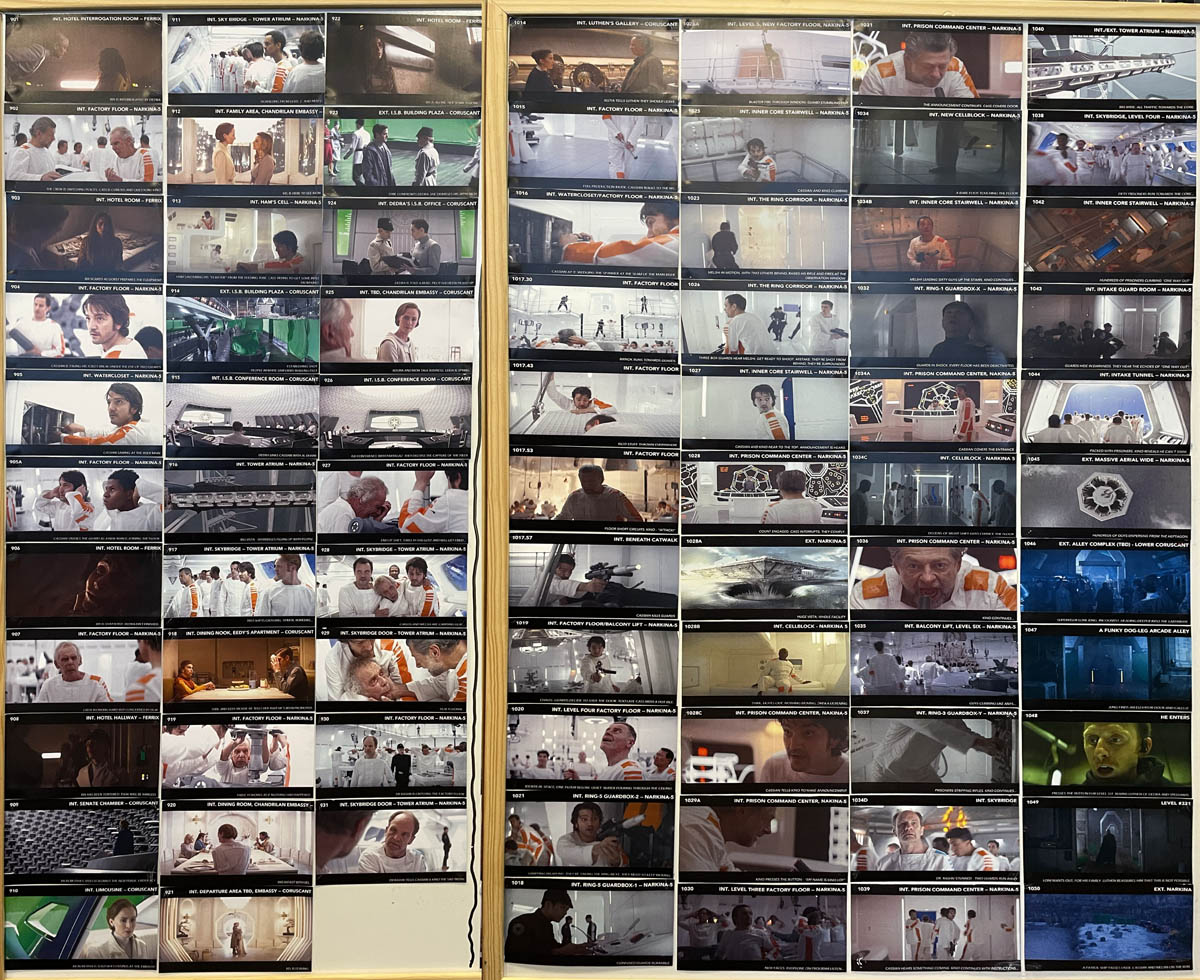
Storyboard on the wall
Gilroy: Four of them came to work the other day for the "fourth be with you." (May 4th) They're in costume, and I see Lea or Darth Vader.
Miles: What I'm discovering now post-covid, is a lot of productions have kept editors at home. There's a choice, right? I used to cut from home pre covid, right? I used to do four days, and if I had a crazy idea, I'd go back to my studio at home in the garden and I'd splash out the scene from inspiration at 10:00 pm night or something. Or, 6:30 in the morning because I couldn't do it in the confines of my cutting room with coffee machines and people asking me to go out and, interrupt. Strangely, post-covid, now it's gone away. Some of us have gone off and still stay separate. It allowed us to do that a bit. It's a little bit harmful in a way because people are being further apart. Andor was a good example of not doing that.
Gilroy: All being apart all the time could never be as good as being at work.
Smith: We were given our own episodes to work on. There is something that comes from that. To be trusted. John is also an editor and knows exactly how we all think. He knows if you give something to someone to be proud of and to own, to some extent, they will work their ass off for you. There are some shows where it doesn't feel quite like that. It certainly shows where there's a lot more collaboration and sharing going on.
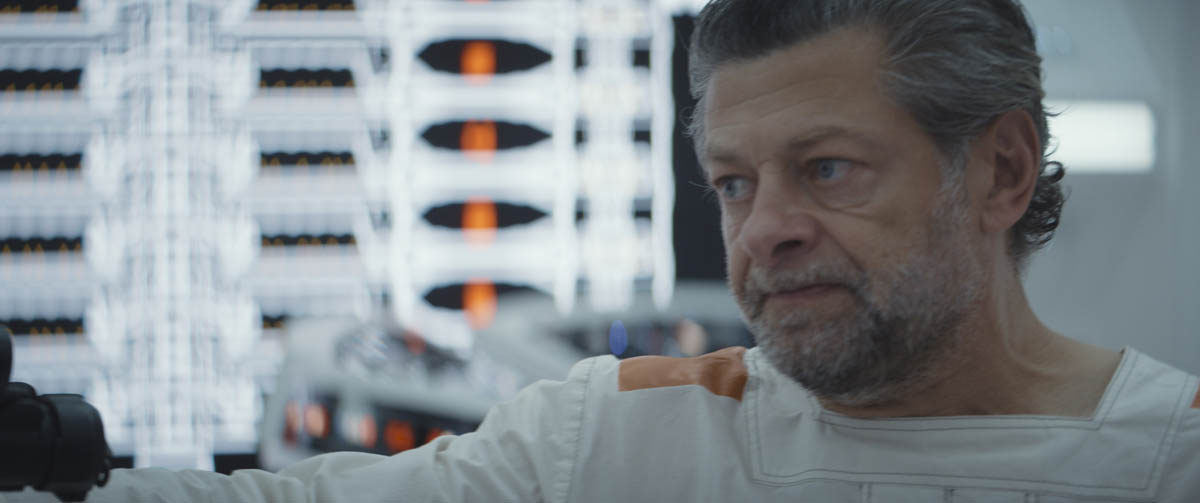
Gilroy: ... you need to take ownership. My personal theory is the best things, the best movies, and the best shows probably have a smaller brain trust. Just having a core bunch of people. The director, showrunner, and a few people, but not a lot of people weighing in. Tony and I have always tried to keep it like that for ourselves with the movies we've done and applied it to this.
Miles: I always remember speaking to John on the battlefield. I was in the thick of it. And he'd say, "How are you?" And I'd say, "I'm in the thick of this." And he'd say, "Well, I'm sure you know what you're doing." It felt like a huge reassurance to just keep going. And, that from experience and that comes from that. As you know, with editing, you can go down the wrong path very quickly, and not know it. Not saying I often do, but it can, it can happen. [laughter]
The assistant editors are probably the people most affected by “working from home.” They're doing their job and they're really not getting the interaction with the editor as much as they normally would. They're not seeing the editor-director relationship as much as they normally would.Gilroy: It's got to be hard. I'm the only one old enough here who started on film. I used to cut on Moviolas. I hate to date myself, but, back then you had a lot more interaction as a first assistant, you were a nurse in an operating room. You got to see how it was done.
With non-linear machines, there's already a bit of removal. You're not in the room. It's a different interaction. We interact really well with our assistants, but it's a different thing. Then you take one more step where everybody's at home doing it by themselves. You really must feel like you're in a vacuum sometimes.
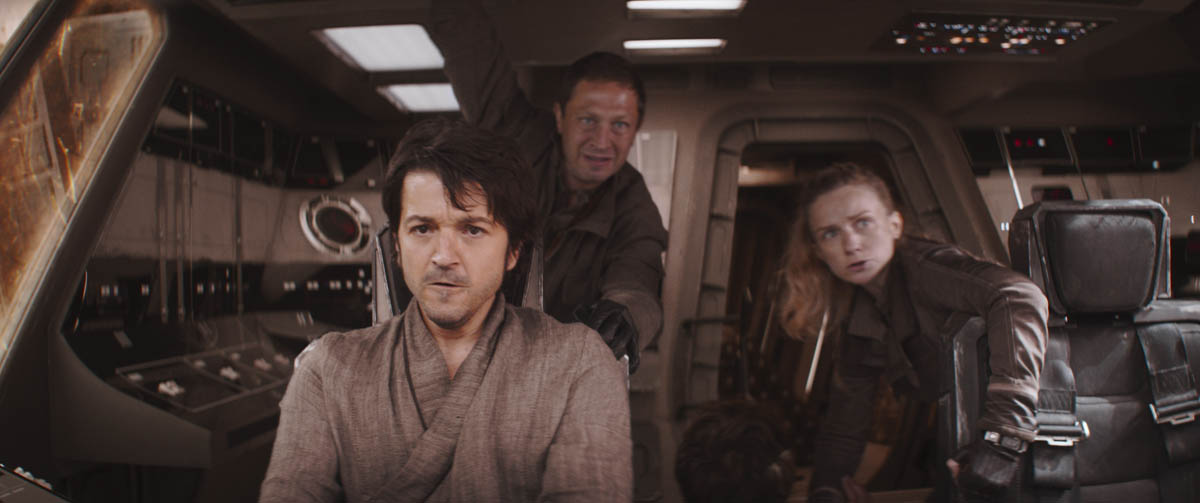
Smith: We all had our own individual first assistant. And then we had shared second assistants and a shared dailies assistant, and so on. My first assistant throughout was Craig Ferrera, who I'd worked with on a few projects before I'd worked with him on Chernobyl.
He would sit in the room with me and we would watch the rushes together. I'd get in and he'd have it all lined up and we'd watch the rushes down together. We'd talk about the scenes that had come in. We'd talk about any of the notes that come in. Quite often, I'd divvy it up and say, "Okay, well can you go and assemble this one and I'll take these two?" Craig's fantastic. Craig stayed on for series two. He is working with John now on series two.
Gilroy: You must have taught him something. I stole him from Simon and then, he's going to be an editor on block four.
Smith: He's great.
A bump up.Gilroy: Yeah, that's a big one.
That's fantastic.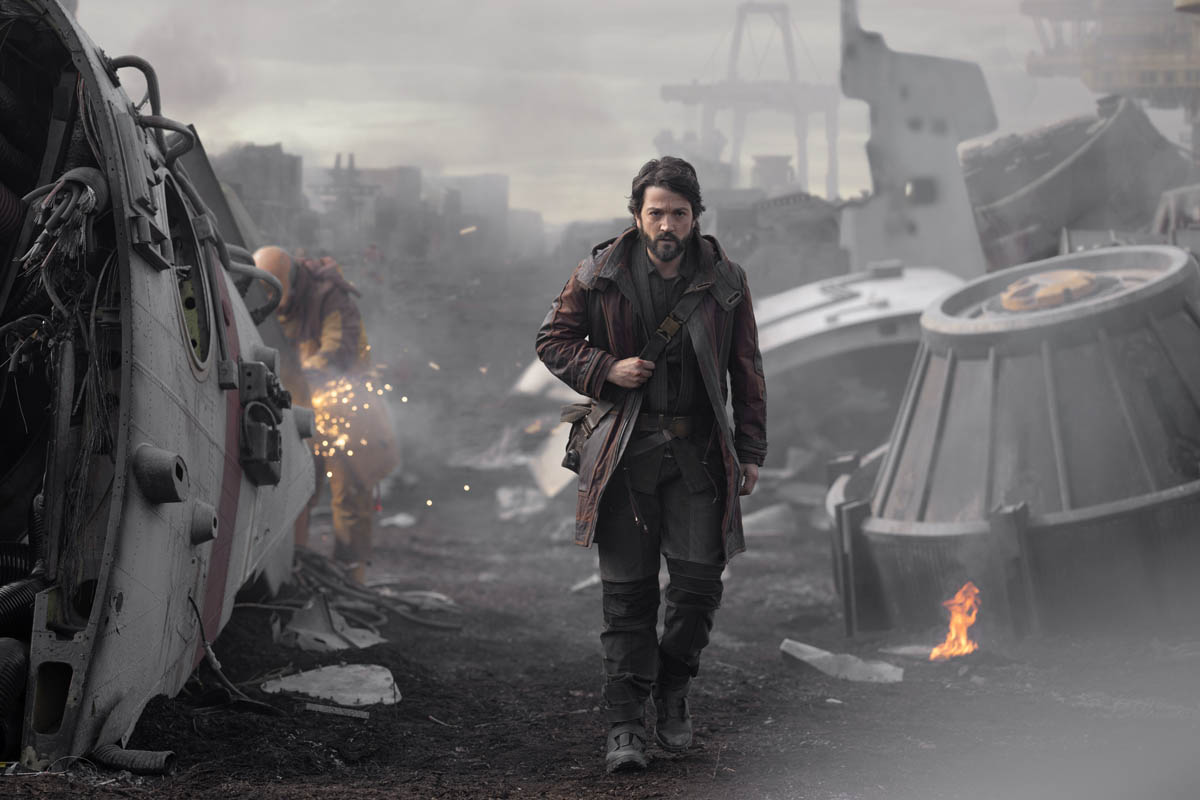
Miles: Watching rushes with assistants: I do that here. I've got a second and a first. We all talk about it in the morning. I'm sure we could set that up in some digital streaming way, but again, it's under their skin. The embarrassing part for me is the assistants give it back and then I recut it and then the director comes in and asks to have the assistant's edit back. [laughter]
They're so good. They are like Swiss Army knives. We've got 34 tracks, 8 tracks of music and sound, and they manage it so well.
Smith: Thinking back to when I was an assistant, if I was on Star Wars, I'd be the happiest assistant ever. So, I'm sure they're all very happy with the job.
Did you find moments where, in editorial, you were finding better moments to cut back and forth between stories or change the juxtaposition of one thing to another when you were jumping back and forth?Smith: I'd love to say yes, but no, not at all. [laughter] On my episode, I had cards on the wall that show each scene. The wall filled up, and then it didn't change. I never moved those cards at all. The thing I love about Star Wars, in general, is as a storytelling piece is what I call "Star Wars" editing. And it's where you're in one story and then you peak with adrenaline and interest in what's happening in that story. Meanwhile, back at the ranch, over here, this is what's going on. Luke, and so on are in a trash compactor. Then meanwhile, somewhere else we're doing this in Andor it's just as Cassian is... something's going to happen. Meanwhile, we go over to Bix or Dedra and so on. I love that. If I get a script that has got those storylines that interweave and the peak when we then go somewhere else it allows you to craft a real ride in the episode. Something that, as a viewer, you can experience and strap in and enjoy. Definitely in Yan's finale the ride of that, that final episode...
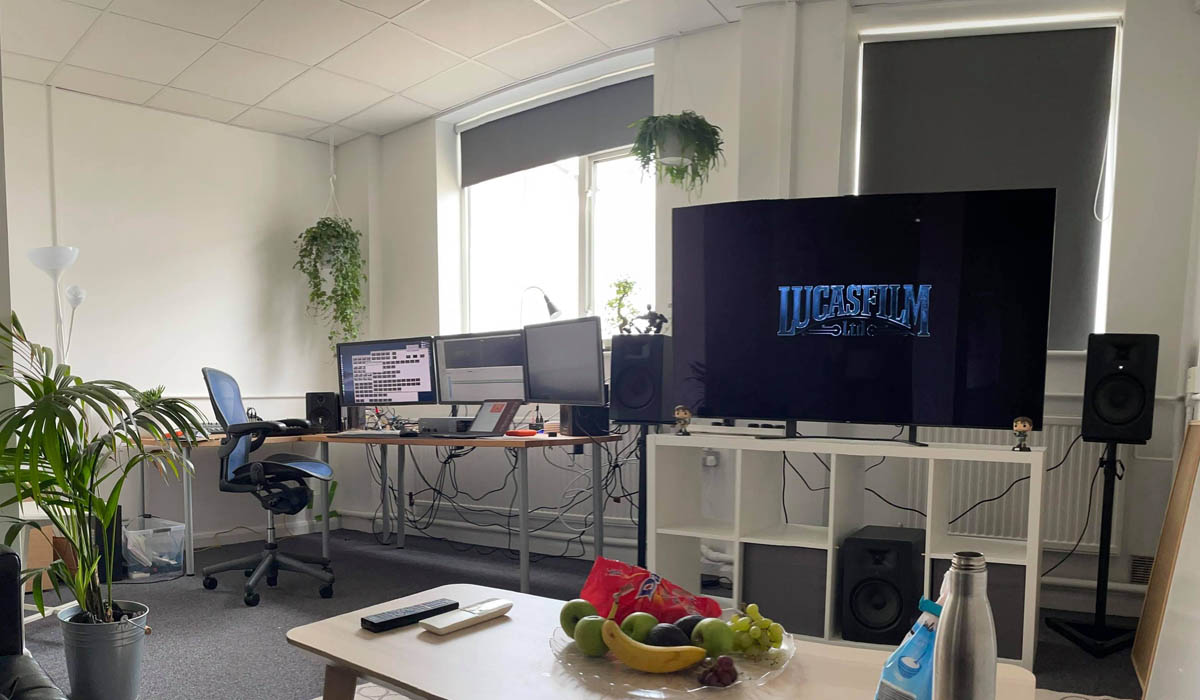
Simon's cutting room
Miles: Rix Road probably had a bit more movement and swing in it. The first fifteen scenes before Cassian comes back, it had Wilmon building the bomb that Ben shot in macro shots. That was just one scene I intercut that whole flurry of scenes with the bomb. I started to do it a little bit and then Tony said, "Make the bomb the thread."
I had ADs walking around on film sets. It was filmed on iPhones of people walking around the sets. Tony wrote the piece of music first. He and Nicholas Britell wrote that piece of music for the marching band. I had this piece of music and then had all this iPhone footage that I pieced together. They recorded the band live in the field in the backlot so they could get a sense of the instruments playing live and being outside. They brought the band in that played the instruments and they had micro click tracks in their ears and they played along with it. I had the spine of it already. It was integral that all that stuff from my iPhone version followed the music.
But, of course, when those cameras came out and those long lenses came out, everything changes. I want to be on this shot and this guy's not playing the instrument at that point. If I pulled at one shot, it would pull everything apart. It was a music video, I guess. It was complex because it was not just putting the musicians in, I had to put all the characters and weave them in and out. The script is a guide when it comes to that.
Gilroy: You can only come so close. There was a lot of prep, and that prep came in handy. All the choreography, that's why it looks great. But the chaos and all the other stuff that you have to hose down a little bit and then that's stuff you do have to find in the cutting room. Chaos has to be cultivated later on.
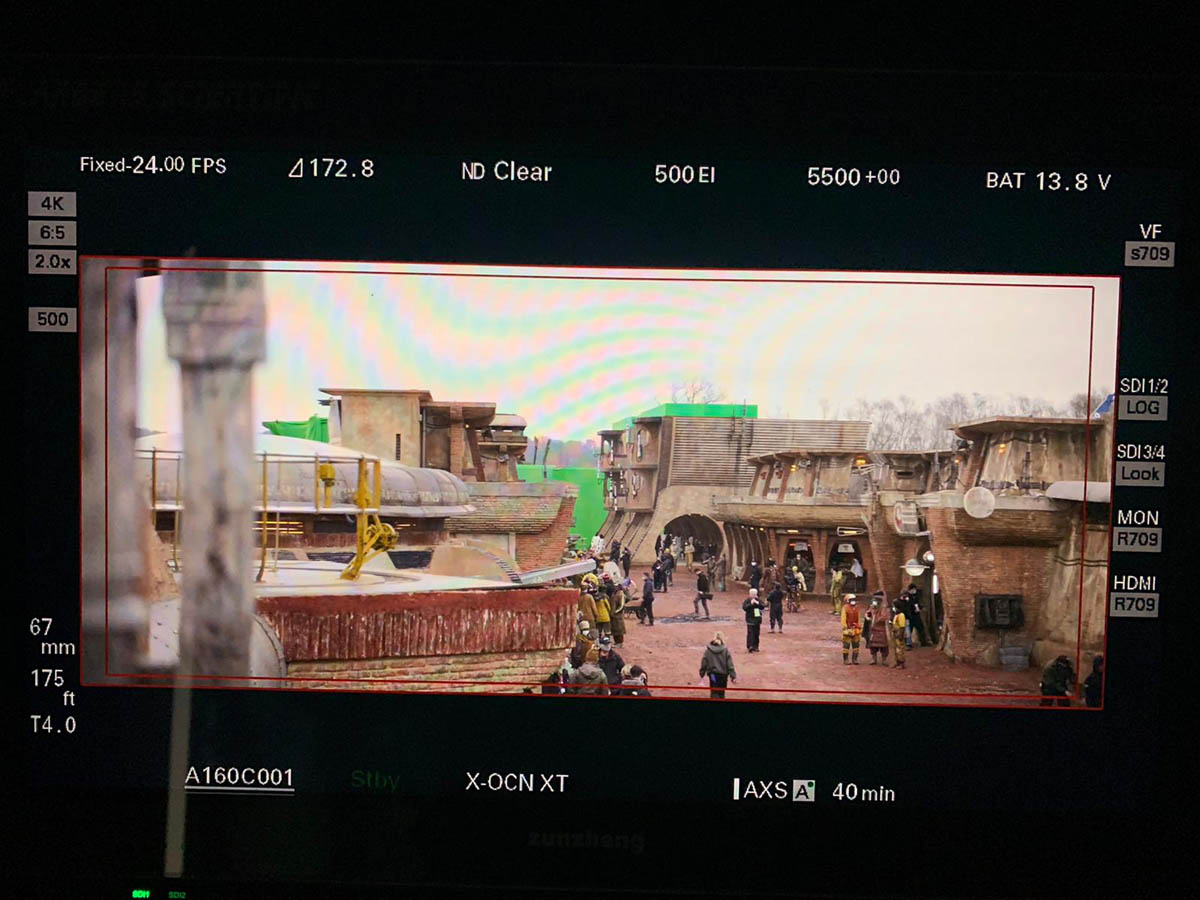
Miles: There was a piece of music that was called, “Forming Up.” Just before they start walking down the Rix Road where they do the pipe section, which was extraordinary. They all formed up in that section. There was a piece of music that I could not get to work. And I've never told anyone that I just dropped this whole section. Cause I went from one to the other. Tony never even batted an eye, never even said anything. It just worked seamlessly.
That musical rhythm was harder. When we finish the song, then we have Fiona Shaw as a hologram, doing a monologue that then I had to swing around everyone again. And I thought, "When does this beast end?" Then it turns into a war after that, and Fiona's performance, which started off as Ben was on set, recorded, her voice. I cut all of that on a wild track. Some of it actually stayed, even when we reperformed, I refitted some of that performance cause she was so good on that very first read. So emotive. I kept it because it was a hologram on the reverses. I could use it, but it was like an onion layer after an onion layer with Rix Road.
There's a scene with Davo, they're talking about banking and marrying off the one woman's daughter. I wanted to talk about the idea of those dialogue scenes. You were saying how difficult they are to cut sometimes, especially when you don't have just two people looking at each other when you've got a trio or even four or five. Talk about trying to build those scenes using eye lines, what coverage maybe you're getting, and how you use that to amplify what's being said with the storytelling of the shots you're using, not just the performances.Smith: It's nice for you to pick that scene out. I love that scene. As John said earlier, how every character is rich and has their own backstory and history. The Davo guy doesn't appear in many episodes, but that actor is so good whenever he turns up.
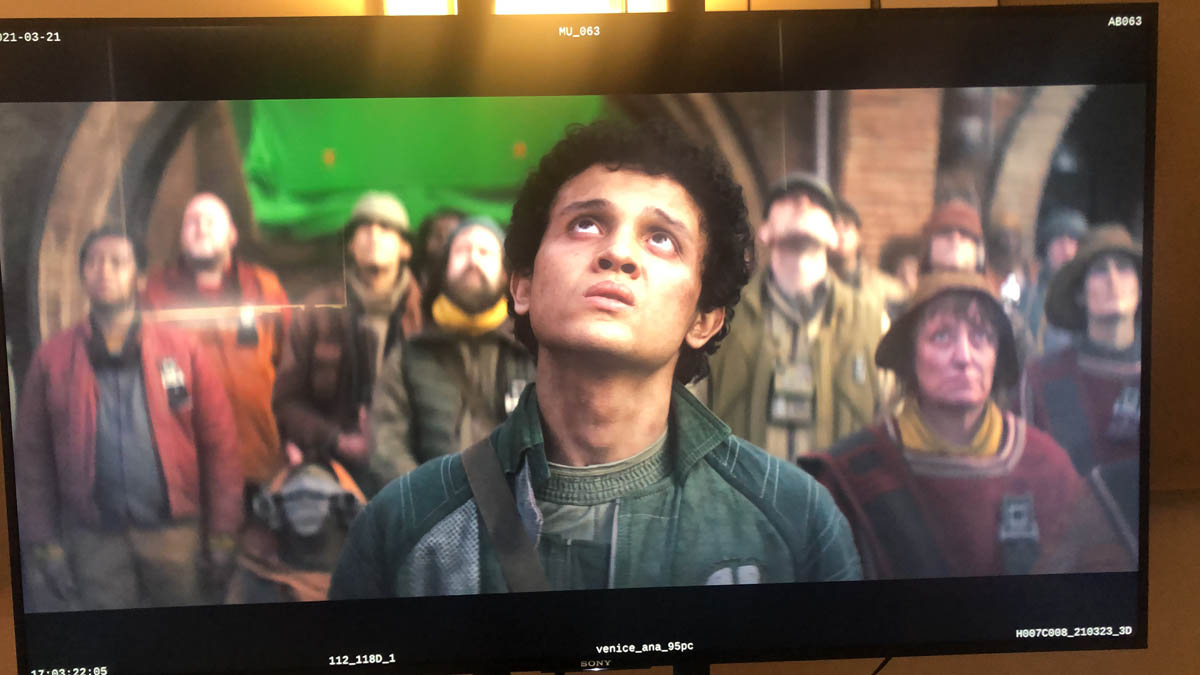
The casting is, brilliant. I would've had two cameras on a lot of it. Toby, the director, and the first AD, would've properly covered it. There's not a single beat missing. So there's never a moment that I didn't have. It's not like I'm trying to patch something or cover something up. If I want to be on this person at this time, I know I can. I cut with ScriptSync. All of that scene is lined up with the script. I start by watching the rushes and feeling my way through them, and where do I feel something? What moment in what take do I feel something? And I'll note that down during the dailies or, between me and the assistant, one of us will mentally note it down.
I'll open up the ScriptSync and, basically, just block it out from the ScriptSync. I'll know, okay, I want to be on this character here. I want to cut to this person here. Because of the ScriptSync, the amount of time invested in watching the dailies, and the assistants setting ScriptSync up, my bit's quite quick. I find that cutting is quite easy. John, do you, do you use ScriptSync in the same way for those dialogue scenes?
Gilroy: I don't.
Miles: As long as I have a marker on "action," I have my inbuilt ScriptSync. I block it out in my way as in a timeline block. If it's lots of dialogue, I go back, but I use the blocking first to take me back
Smith: Interesting.
Miles: Then question the performances and just go between those performances. Performance comes from me, comes from the delivery of the actors, one whole piece, and I have to stick with that. I'm more led by the lens and the framing and the shot as well as I am the context. If it's on a long lens, it reads a certain way. So ScriptSync doesn't necessarily give me that.
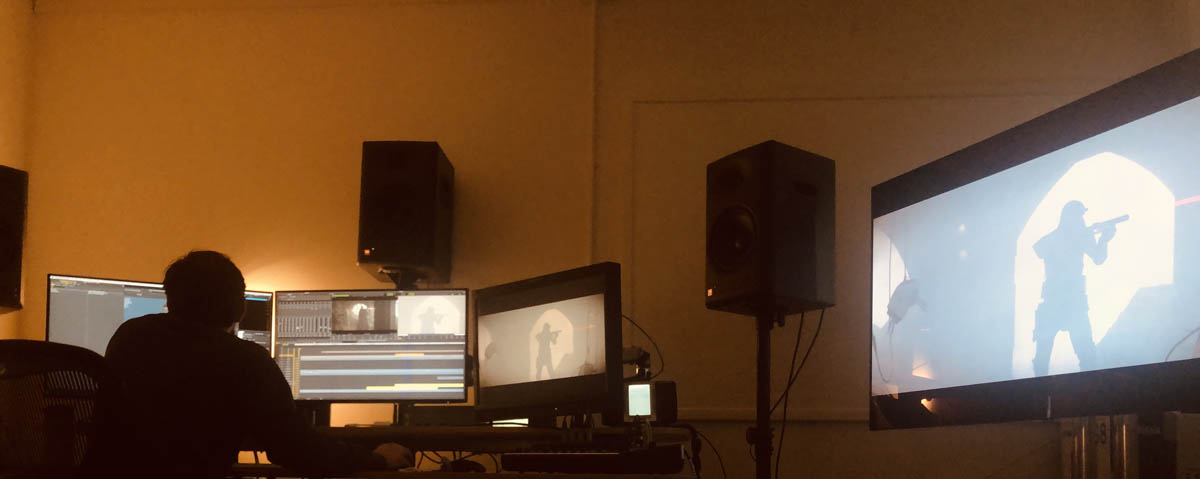
Yan Miles' cutting room.
Gilroy: I often use it after I'm done or I think I'm done and I just want to make sure I didn't miss anything. I can usually figure out the architecture of the scene very quickly. I flesh the whole thing out, get the architecture the way it's going to be, or the way I think it's going to be. And then I'll go back and upgrade. And I'll look through every performance and then, for me, it's the number of passes. A first pass, a second pass, a third pass, maybe a fourth pass, but a fourth pass I usually feel like I rang it out.
Miles: John is actually ScriptSync. [laughter] HE is ScriptSync. But Simon, the method is the same. Because Simon, you're just doing it around the other way. You are going down one path, but you are confident of that path that it because you are doing it in the live, die, repeat of it.
In many ways, we're just doing the reverse engineering of that. I like what John says when he says about good material teaches you the architecture, doesn't it?
Sometimes I surprise the director. They say, "You didn't do this anything like I wanted it, but I like it."
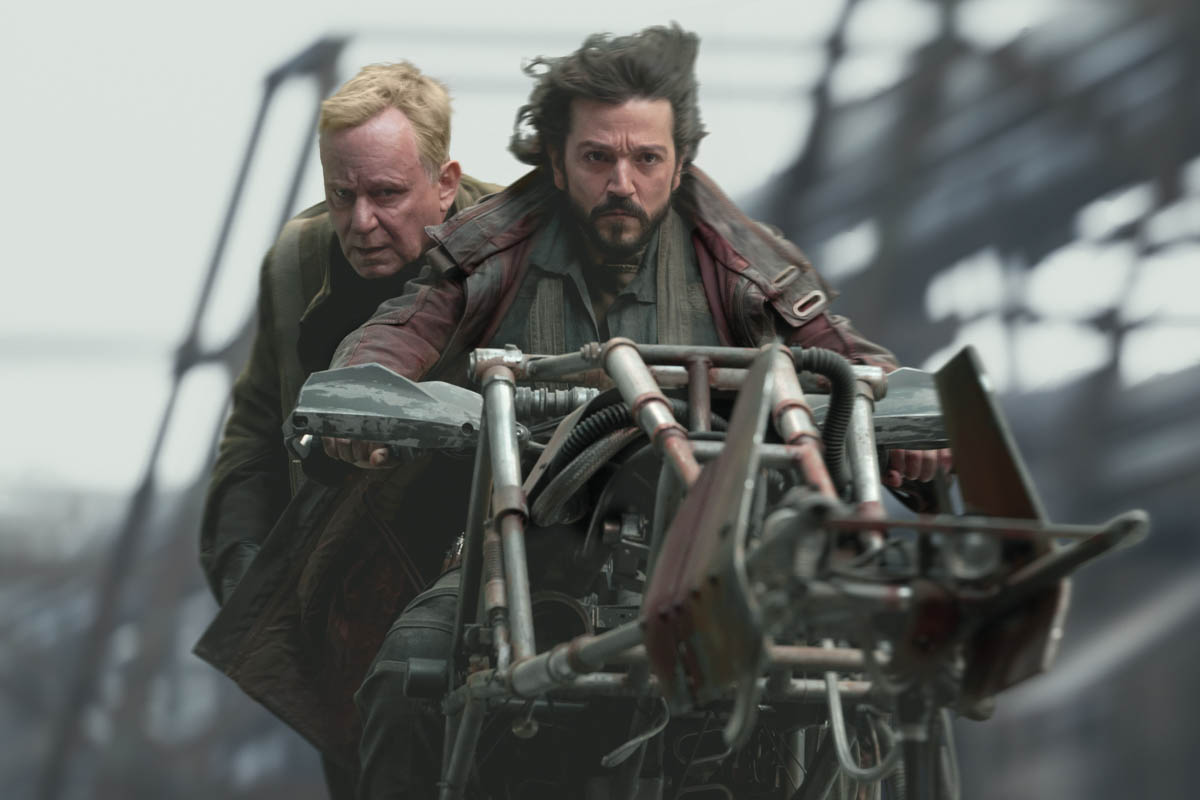
Smith: I had quite a few monologue moments. Even in that Davo scene, there are moments where it's one character talking and talking and you're holding on to that for as long as you can. I did love how well-written these scenes were that you could suck people into just holding on a take or sitting with someone. And then just as that gets to the "ah-ha" moment, you can then cut to the reaction or to see what Mon [Mothma] was doing or, in other scenes later on what Robert Emms' character was doing. That comes from those longer monologue-type parts of the dialogue in my episodes, definitely.
Miles: It was a really good scene, wasn't it? It was an electric scene.
Gilroy: That's one of my favorite scenes in the whole season: Luthen, when he dresses down Jung in the elevator. Those two scenes are just like among many fantastic scenes, I mean, many, many...
Smith: ...I got a Stellan Skarsgård and an Andy Serkis monologue in episode ten.
Gilroy: You got them both, didn't you?
Smith: I saw someone write on Twitter, "Just as you think you've seen the best monologue in Star Wars with Andy Serkis, you get another one from Stellan Skarsgård. It was brilliant. I'd been fortunate enough to have Stellan Skarsgård do equally brilliant monologues in Chernobyl.
I thought about that monologue outside the elevator, because obviously, the performance is so strong, but then you're also trying to make it visually and emotionally interesting beyond that with the reactions, and you’ve got great production design.Gilroy: What I liked was and, it wouldn't have been my first instinct, were the jump cuts in the elevator.
I noticed those, too.Gilroy: It was a little artier than like... the first time I saw it I thought, "Oh." But you know what? Watched a couple of times, it was very effective. It just set up the paranoia and it disoriented you in the right way. It put you in Jung's shoes. So when that door opens...
Smith: Toby was the director. We all get our notes from the script supervisor and the note on the day was, "Just use this take in one go." [laughter] He didn't want me to cut it at all. He said, "This is the take, this is great. Just use this one." But I thought, "I've still got another six hours of work on the top today. You know, I should..."
Gilroy: You get paid by the cut. So of course you want a few. [laughter]
Smith: I get paid by the cuts. I'm sure this is the same with a lot of people on these shows. You come in, in the morning, and you've got the three scenes they shot the day before. You want to get through those three scenes because the next day you have another three scenes from the next day's shoot. You're always editing one day behind the camera. You're keeping up with the camera that way. If I had a single cut that could work, I’d think, "Okay, let's use an hour to just experiment and see what else we could do. Sometimes I'm jump cutting, but within the same take, I think often it's within the same take as well. It's not even, it's not to a different take necessarily.
Gilroy: So you're obeying Toby, is what you're saying? [laughter]
Smith: Taking a second out just to shuffle it around a bit.
The other thing, of course, is when you get a note from a director saying, "Just use this." It's a clear direction. But, as long as you have that to show them, right, it's okay. Because if they go, "Oh, those jump cuts, I hate those." You can respond, "Well, here's the one take that you wanted. It's there we're done." You can get yourself outta jail.Gilroy: Absolutely
Miles: You jump cut within the same, did you, Simon? [laughter}
Smith: Because it was a handheld camera…
Miles: You just have the visceral movement.
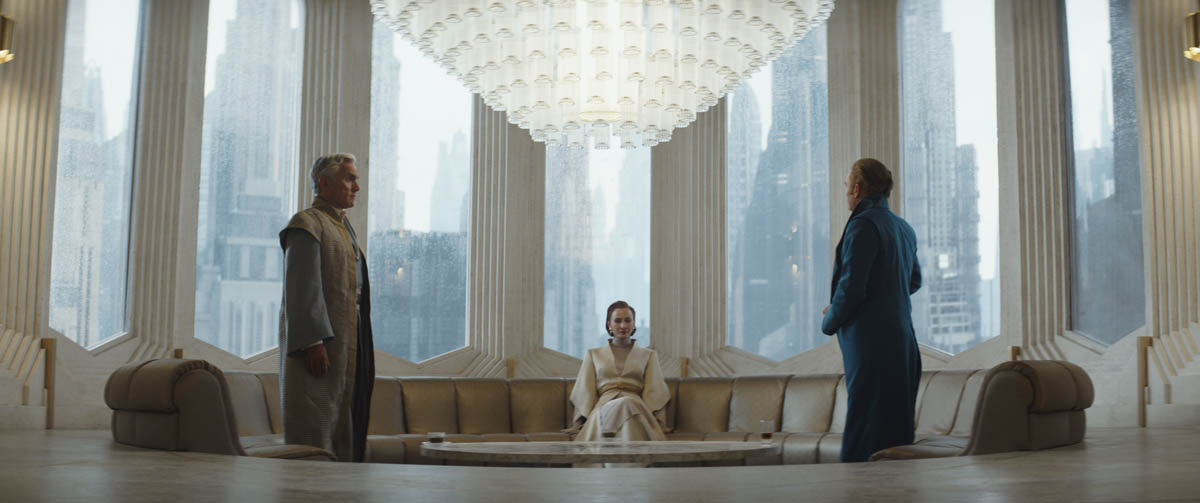
Gilroy: I think it was because Simon really wanted to get to that great scene and he just couldn't wait. He just was rushing that fucking elevator down... [laughter]
Miles: Toby's one shot is no more one shot. It's three shots.
Smith: There's no way I'll let him do it in a oner. I'm going to stamp the edit on there whether I need to or not. [laughter]
Miles: Yeah, I had an assistant show me this though. I've done fair, visceral jump-cutting for different reasons, but they showed me the one where they had a little morph blend or something. You stuck on a little move and I thought, "That's ridiculous." You could be out by quite a bit and morphed it together in the Avid. That I'd never seen before. Jump cuts for reasons to be aggressively visceral. It's not like the two shots were identical. Fluid morph? I didn't even know it existed.
Emmy voting has started. We just came out of the ACE Eddies a while back. I know that you've all been nominated or won awards. What do you think your peers are looking at or what are you looking at when you are trying to judge someone else's work for things like the Eddies, the Oscars, the BAFTAs, and the ACEs?Gilroy: You're not really looking like an editor. You're just looking like a filmgoer, or watching television. You're looking for something that moves you and something you really love. If you love it, it's probably well put together. What we do is invisible. You're not supposed to think about what we do. But, sometimes, sometimes people jumpcut in an elevator. They're actually putting the editing up there a little bit. It's just about plugging in and responding to things you really love.
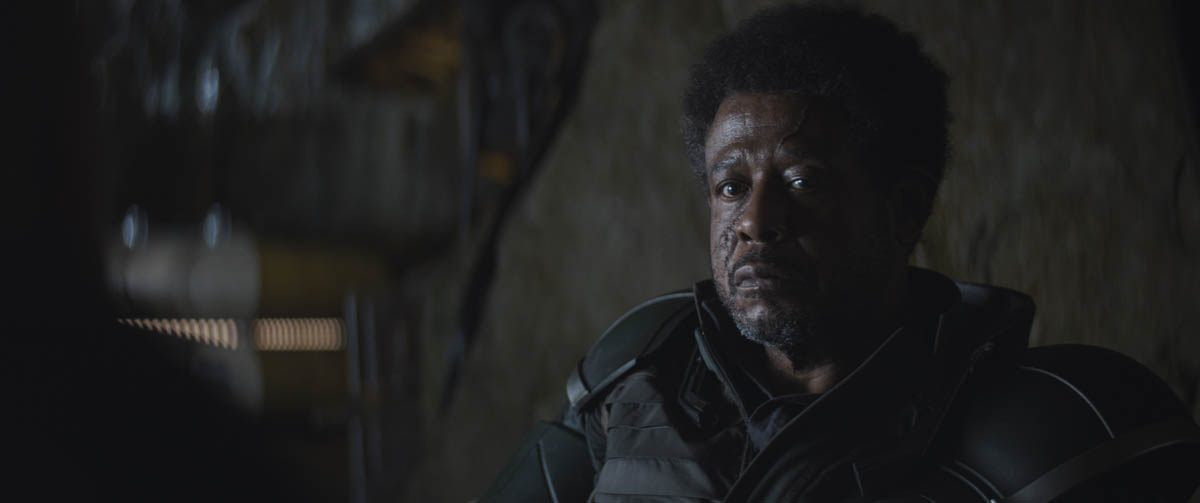
Miles: I think it's what you said at the beginning of this conversation about craft, I think it's honesty. If I watch someone's work and it has an honesty to it, I'm drawn in and it holds me. I guess I don't want to be held, I don't want to have a hand. I just want to be too taken on a journey, and the edits disappear when I'm on a journey. Afterward, you look at it and think, "That's fabulous." After that storytelling, you know it's been handled well. There's something inside it. It's great storytelling and it's handled well with fantastic performances. But the editing maneuvers itself out of it. I still find myself looking in awe of it afterward I think, "That's pretty special." Like Simon's lift jumpcuts.... [laughter]
Smith: I'm just looking for lift jumpcuts. If they've done a lift jumpcut…
…they get the award. Okay. I, I'm going to be thinking about that cause I think maybe I can get an Eddie that way.Smith: [laughter] We were up against Euphoria and Severance at the Eddies. Those two shows are so well-cut and superb. I think what television is doing really well, at the moment, and over the last few years, and certainly with the shows that we're all fortunate enough to work on is giving the viewer an experience. You sit down and you feel like you've had an experience watching something. I certainly feel at the end of Yan's episode, and also at the end of the heist in episode six, “Wow, I've just had this visceral thing, body reaction to what I've just watched in an adrenaline-filled way or in an emotional way.” That does come from great editing. When you get that from Severance or from Euphoria or you get that from any of these award-winning shows, it has happened in the cutting room. You can't get that feeling from bad editing, you know?
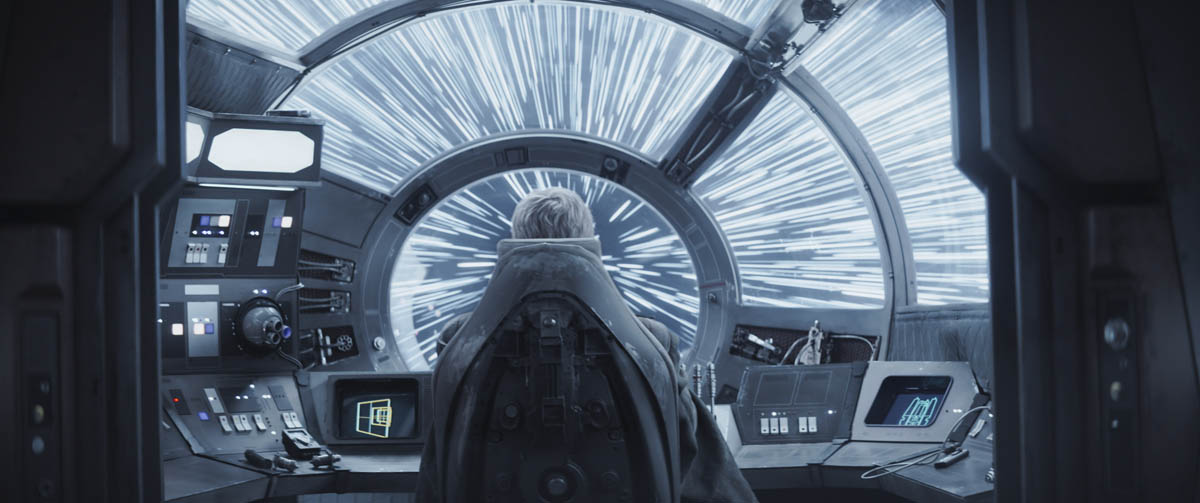
Gilroy: We build the shows. We build them. That's what we do. I mean, we're building the show.
Miles: Going off what you were saying, Simon. I remember reading the audience watch stuff you've made and they forget to breathe because the biorhythm of the rhythm of editing causes that pulsating rhythm. That human instinct is for us to take on a rhythm. It's naturally that way. When people catch hold of that you forget yourself. You lean in, don't you? It leans you in. And like Simon says, television has been fantastic for many years, but there are so many things I see now I just cannot help myself to lean in. What's amazing is some of them are like 28 minutes long and it wouldn't matter. And some of it's 60 minutes long and it wouldn't matter. It's just good storytelling done in, in a very, very clever way.
Smith: Yan is especially good at it as well. He wouldn't say it himself. [laughter] But, Yan edited The Crown and Sherlock. I remember both of those episodes vividly, and just how brilliant those shows were. And that does, I'd say, of course, I would say I'm an editor, but I'd say the editing plays a huge part in that.
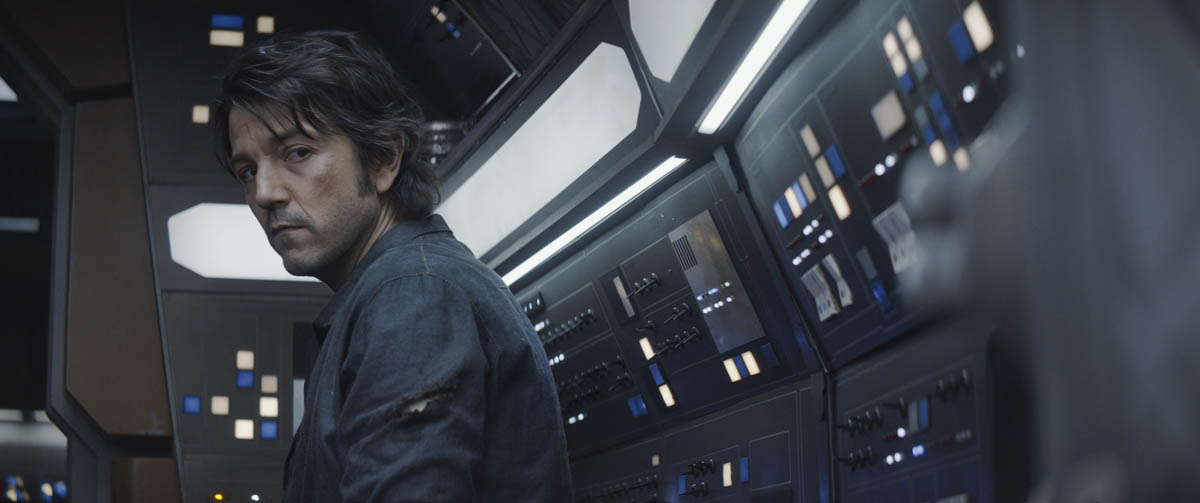
Gilroy: Absolutely.
Gentlemen, I've taken up too much of your time, already. Thank you so much for joining me to talk about Andor. It's been so interesting to chat about this show and I thoroughly enjoyed it.Gilroy: Thank you for having us.
Smith: Thank you, Steve.
Miles: It's been a pleasure.
